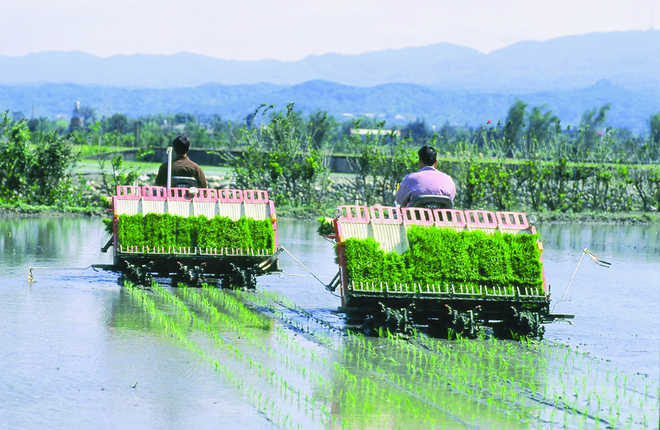In an era marked by growing environmental concerns and the imperative for sustainable development, the agricultural sector faces mounting pressure to adopt practices that promote ecological balance, social equity, and economic viability. Amidst this backdrop, Farmer Producer Organizations (FPOs) emerge as pivotal actors, embodying the principles of sustainability through their collective endeavours.

Fostering Agroecological Practices
At the heart of sustainable agriculture lies the adoption of agroecological practices that minimize environmental impact while maximizing productivity. FPOs serve as catalysts for the dissemination and adoption of these practices among their members. Through training programs, demonstrations, and knowledge-sharing initiatives, FPOs empower farmers to embrace techniques such as organic farming, conservation agriculture, and integrated pest management, thereby reducing reliance on synthetic inputs and preserving soil health (FAO, 2018).
Promoting Biodiversity Conservation
Biodiversity conservation is intrinsic to sustainable agriculture, as diverse ecosystems enhance resilience and ecosystem services essential for food production. FPOs play a vital role in promoting biodiversity conservation by encouraging crop diversification, preserving indigenous varieties, and supporting habitat restoration efforts. Case studies have demonstrated how FPOs collaborate with conservation organizations and research institutions to promote biodiversity-friendly farming practices, contributing to ecosystem health and agricultural sustainability (DeFries et al., 2020).
Strengthening Resilience to Climate Change
Climate change poses unprecedented challenges to agriculture, including extreme weather events, shifting growing seasons, and altered pest and disease patterns. FPOs are at the forefront of building resilience to these challenges by promoting climate-smart agriculture practices. By adopting techniques such as rainwater harvesting, agroforestry, and climate-resilient crop varieties, FPOs help farmers adapt to changing climatic conditions and mitigate the adverse impacts of climate change on agricultural productivity and livelihoods (FAO, 2021).
Empowering Rural Communities
Sustainable agriculture is inseparable from social equity and economic prosperity in rural communities. FPOs play a vital role in empowering smallholder farmers, particularly women and marginalized groups, by providing access to resources, markets, and decision-making processes. By fostering inclusive governance structures and equitable distribution of benefits, FPOs contribute to poverty reduction, food security, and social cohesion in rural areas (World Bank, 2019).
Leveraging Technology for Sustainable Agriculture
In addition to promoting traditional agroecological practices, Farmer Producer Organizations (FPOs) are increasingly leveraging technology to enhance sustainability in agriculture. Digital tools and platforms enable FPOs to collect and analyze data on soil health, weather patterns, and crop performance, allowing farmers to make informed decisions and optimize resource use. For example, in India, the Digital Green initiative empowers FPOs with video-based agricultural extension services, delivering locally relevant content to farmers through low-cost technologies (Narayanan et al., 2018).
Facilitating Access to Sustainable Inputs
FPOs play a crucial role in facilitating access to sustainable inputs and technologies that promote eco-friendly farming practices. By aggregating demand and negotiating with suppliers, FPOs can secure access to organic fertilizers, biopesticides, and precision farming equipment at affordable prices. Moreover, FPOs collaborate with research institutions and agribusiness companies to promote the adoption of sustainable technologies such as drip irrigation, solar-powered pumps, and biodegradable packaging materials (UNDP, 2020).
Promoting Fair Trade and Ethical Practices
Ethical sourcing and fair-trade practices are integral to sustainable agriculture, ensuring that farmers receive fair compensation for their produce and adhere to environmental and labour standards. FPOs serve as advocates for fair trade and ethical sourcing, promoting transparency and accountability in supply chains. By obtaining certification from recognized bodies such as Fairtrade International or Rainforest Alliance, FPOs demonstrate their commitment to sustainable production practices and ethical conduct, thereby enhancing consumer trust and market access (Fairtrade International, n.d.).
Engaging in Landscape-Level Conservation
Beyond the boundaries of individual farms, FPOs are increasingly engaged in landscape-level conservation initiatives that promote biodiversity conservation and ecosystem restoration. Collaborating with other stakeholders such as government agencies, NGOs, and community-based organizations, FPOs participate in watershed management, agroforestry projects, and habitat restoration efforts. These landscape-scale interventions not only enhance ecosystem services such as water purification, soil erosion control, and carbon sequestration but also contribute to the resilience and sustainability of agricultural landscapes (International Union for Conservation of Nature, 2018).
Conclusion
The role of Farmer Producer Organizations in promoting sustainable agriculture cannot be overstated. By promoting biodiversity conservation, strengthening resilience to climate change, and empowering rural communities, FPOs embody the principles of sustainability in action. As we confront the challenges of feeding a growing population while safeguarding the planet’s finite resources, the collaborative efforts of FPOs and their members offer a promising pathway towards a more sustainable and resilient agricultural future.
References
- DeFries, R. et al. (2020). Biodiversity Conservation: The Key to Sustainable Agriculture. Science, 367(6479), 979-982.
- Food and Agriculture Organization of the United Nations. (2018). Agroecology for Sustainable Agriculture and Food Systems.
- Food and Agriculture Organization of the United Nations. (2021). Climate-Smart Agriculture Sourcebook.
- International Union for Conservation of Nature. (2018). Landscape Conservation in Action: An Introduction for Policy Makers.
- Narayanan, S. et al. (2018). Digital Green: Participatory Video and Mediated Instruction for Agricultural Extension. Annual Review of Resource Economics, 10, 539-560.
- UNDP. (2020). Using Digital Agriculture to Improve Sustainable Farming Practices.
- World Bank. (2019). Rural Poverty and Hunger: A Global Perspective.
- Fairtrade International. (n.d.). What is Fairtrade?
